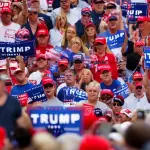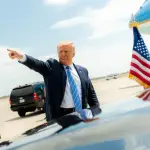Harry Enten of CNN recently found himself scratching his head on the million-dollar mystery of the 2024 election: who gains from lower voter turnout? Contrary to what the media would prefer to believe, this existential question doesn’t seem to have a straightforward answer. Former President Donald Trump is only a hair’s breadth ahead of Vice President Kamala Harris in the latest poll from RealClearPolitics, which now shows him leading her by 0.1%. This hardly amounts to a solid victory, especially when the Green Party’s Jill Stein, independent Cornel West, and Libertarian Chase Oliver are all still in the mix, adding more flair to this circus than anyone asked for.
Enten highlighted a troubling trend: Americans feel less enthusiastic about voting this time, a drop from a record-turnout election in 2020. Back then, 88% of registered voters thought they would cast their ballots. Fast forward to now, and that confidence has slipped to 81%. Even those who describe themselves as “extremely motivated” to vote have dropped from 73% to 65%. If you keep this up, folks might be more interested in knitting than politics.
DC Enquirer: ‘The Million Dollar Question’: CNN’s Harry Enten Says He Can’t Tell Who ‘Lower Turnout’ Helps In Election https://t.co/nlpv62mCOg
— Ian Hansen News 🇺🇸🇺🇸 (@IanHansenNews) October 29, 2024
In the latest CNN poll conducted between October 22 and 23, Trump and Harris found themselves eye-to-eye at 47%. If lower turnout is on the table, predictions about who stands to gain read more like a game of political Twister; both candidates could theoretically be in hot water, given that they’re effectively neck-and-neck. So, Harris’s campaign can’t be too pleased to hear that a dip in voter turnout may not offer them the golden ticket they’re hoping for.
These statistics haven’t deterred Harris and her allies, who have kicked their narrative into high gear, labeling Trump a “fascist” and drawing bizarre comparisons between his rallies and a Nazi-sympathizing gathering from the 1930s. It’s odd how politicians choose to self-immolate rather than focus on real issues in an age of increasingly bizarre, heated takes. With that rhetoric, one has to wonder if Harris’s team is banking on scaring voters into the polls rather than appealing to their better judgment.
In the polling world, the inability to get a crystal-clear picture of what the electorate wants creates confusion that would make a seasoned politician smile. With both sides seemingly at risk from a dip in turnout, this election could be one of the strangest in American history, perhaps proving that voters may be more interested in other matters—like what’s on Netflix—than the latest from the political circus act.




